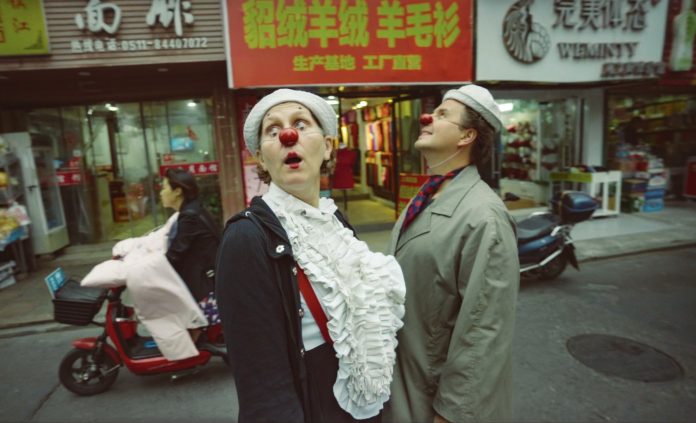The Tallinn Black Nights Film Festival (Pimedate Ööde Filmifestival, PÖFF) first took place in 1996 and has become one of the biggest film festivals in Northern Europe. It aims to bring a comprehensive selection of world cinema to Estonia and the program consists of local and international features, short films, children’s films, documentaries and animation. PÖFF is a great place to see new films and find out what films to keep an eye out for.
The documentary program features a wide variety of films, including three new Estonian productions: My Family and Other Clowns, The Edge of the Night and Lost Stars of the Horoscope.
My Family and Other Clowns
My Family and Other Clowns is a film about married couple Haide and Toomas, who created the loved clowning duo Piip and Tuut. The film follows their journey as they perform 200 shows a year and explores the effect this has on their family, particularly their eldest daughter, Emma, who had to shoulder the burden of responsibility and care for her two younger siblings while her parents were away. The film focuses in on Emma in part via footage she recorded herself on a camera supplied during COVID lockdowns. This angle offers unique and personal insights that may have been missed by a traditional camera crew.
The filmmakers Heilika Pikkov and Liina Särkinen followed the family at home over five years and in addition to this considered family portrait, they captured visually striking images, such as Piip and Tuut walking the bustling streets of China, which broadens out the film and gives a sense of the wider world Haide and Toomas navigate through.
The family opened themselves up to documentation and the trust they placed in the directors is evident. Haide and Toomas allow themselves to be seen with their makeup off, and offstage is where the real story is told. My Family and Other Clowns is an engaging portrait of a family balancing the demands of an artistic lifestyle with the financial and emotional realities of life.
The Edge of the Night
The Edge of the Night is a film about the people who inhabit the dark hours. Filmmaker Vladimir Loginov directs his camera from garbage and maintenance workers to drunken partiers and attendees of an adult club. The film doesn’t linger on the underbelly of the night, however. It begins with a distant shot of a child on a swing, illuminated in orange light between high-rise apartment blocks, and from there the camera drifts past the people who work and live through the night, running entertainment venues or delivering essential services, all keeping Tallinn operating around the clock.
Even though we don’t see much more than snippets of people’s lives, there is enough to build a small picture, even if only by a single emotion at a time, such as the anxiety conveyed by the image of a man nervously standing in the hallway of a maternity ward. Or there is the phone-operator in an emergency services call centre who politely, but curtly, declines calls from people with clear non-emergency issues and listens in with us to the dramatic one-sided account of a life-and-death situation from the perspective of a fellow operator calming a distant caller over the line.
The film is framed by short voice-overs that deliver whimsical descriptions of insomnia that presumably reflect the filmmakers struggle with the night. While this adds an interesting additional layer, and the debilitating effects of lack of sleep are real, the voice-over is so intermittent as to be slightly jarring when it reappears. Another choice could have been to just let the visuals speak for themselves throughout the film, but this is a small note in an otherwise compelling experience. It is recommended to see this film in a theatre where you can let yourself be absorbed in by the imagery and let the darkness drift you into the nightlife of Tallinn.
Lost Stars of the Horoscope
Lost Stars of the Horoscope follows three Ukrainian refugee girls and their families as they attempt to build new lives in Estonia. The film examines the challenges of finding a place in a foreign country and the difficulties of everyday life when confronted with a language that they do not fully speak. Director Katrina Lehismäe shows the impact of the war through everyday struggles, and there are some insightful moments and compelling stories told.
At 72 minutes, Lost Stars of the Horoscope is at the shorter end of feature films, but still it feels a little stretched. This suggests that a more natural length for the film might have been a 40 minute short. It feels like material has been added in an effort to say more, but as a result it may actually convey less. A brother’s feelings of guilt at not staying behind to fight are briefly included but not elaborated upon, which is understandable as it’s not the story being told, but it begs the question of why a new stray thread is being added to the tapestry. Conversely, a teacher’s responses in Estonian to questions asked in Russian by one of the girls highlights an ongoing tension in a country still remembering a time when the native tongue was a secondary language, but this scene is presented as another example of everyday difficulty, rather than perhaps probing the idea and making greater use of a feature film’s scope.
The Lost Stars of the Horoscope features compelling and resilient subjects, and it is a valiant effort to examine important topics and bring ongoing struggle to light, even if it is not an entirely successful piece of filmmaking.
PÖFF is running until 23 November 2025 in Tallinn with select screenings in Tartu.



